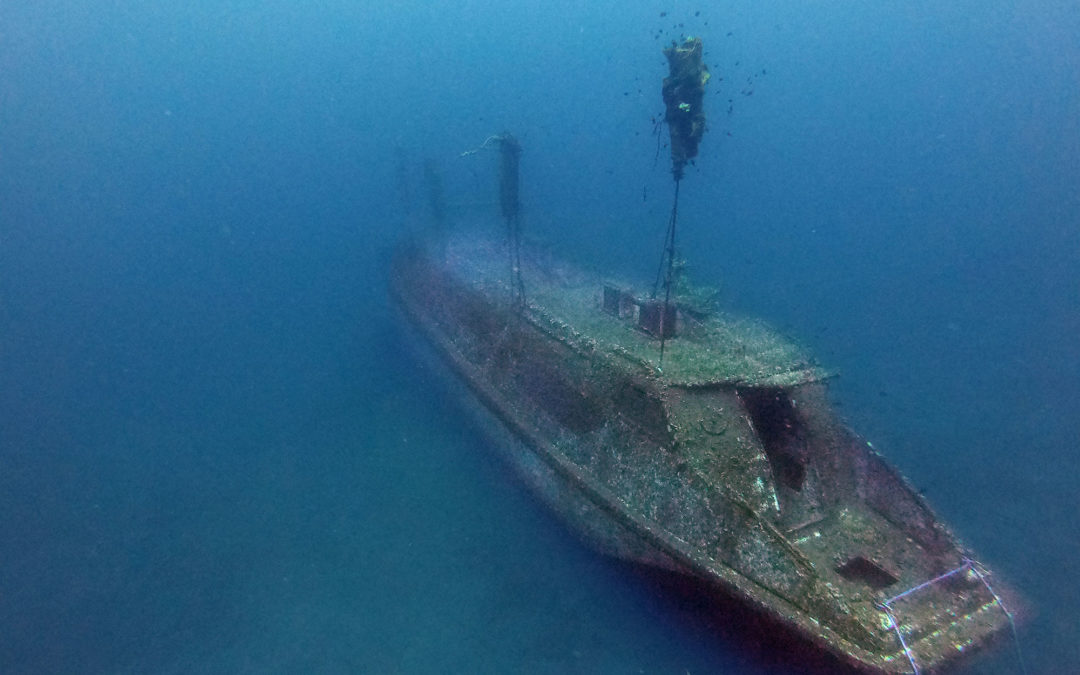
Nov 15, 2019 | Freediving
Amed is famous in the one-breath world for more than just freediving courses and freedive instructor training, it’s also known for its world class wreck diving. Until recently Amed had two wrecks in close proximity to shore that are easy for snorkelers, freedivers and scuba divers alike, plus a third wreck available for advanced freedivers and scuba divers (Amed wreck guide). But that all changed recently when a fastboat destined to start taking passengers between Amed and the Gili Islands sank on its mooring.
Nobody knows what actually happened with the theories ranging from cheap manufacturing all the way through to disgruntled aliens, but the most important thing to remember is that nobody was onboard when it went down. Amen. The other important thing to remember is that this new wreck is VERY conveniently located on the edge of town!
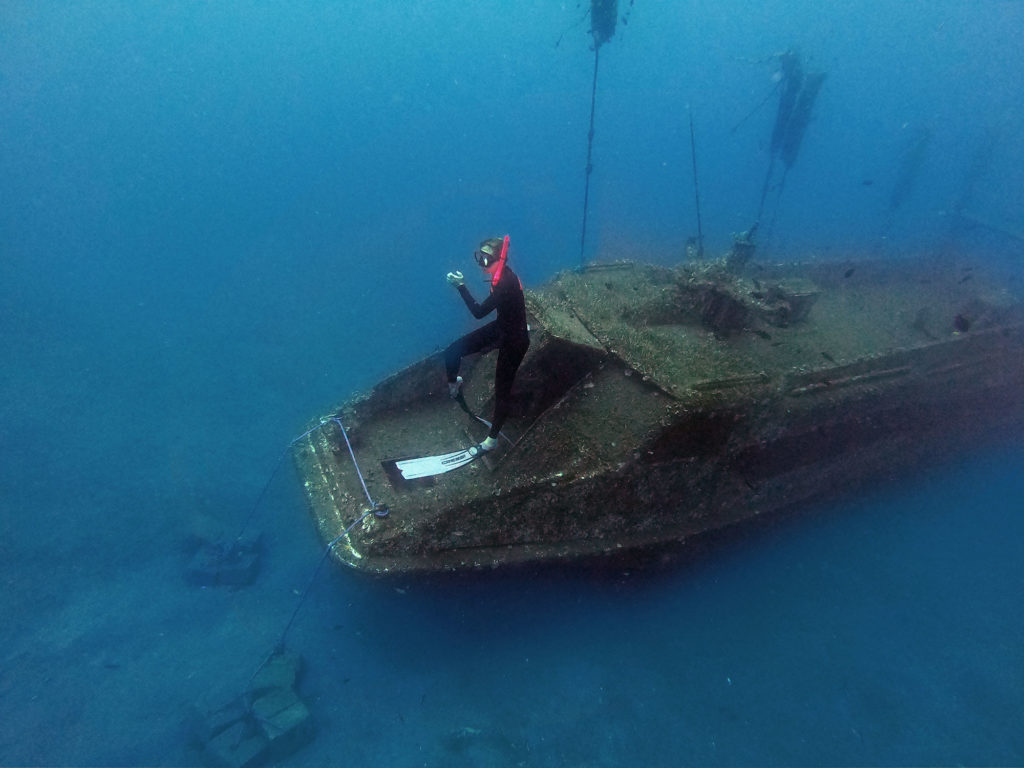
Image: Glenda Duarte (@glendarama)
For those of you that know Amed, you can find the new wreck located at the junction of Amed and Melasti beaches. This is the corner where Green Lemon Warung and Pacha Beach Rasta Bar are located. No, not the Rasta Bar near Indomaret, the other one. No, not Warung Kedai, that’s a rasta bar but it’s not called Rasta Bar. Yep that one.
Now there’s been quite a bit of conjecture about the depth of the wreck but we can confirm as of today that the deepest point of the hull is at 25 metres and the highest point of the roof is at 22 metres (tide depending). This makes it a very viable proposition for freedivers and anyone who has passed their level 2 course should be able to at least get down for a look at the outside, if not sit in the captain’s seat and pretend you’re driving or a passenger commuting to your underwater day-job…
https://www.instagram.com/p/B1iWQbYlw5u/
The fast boat is already covered in plenty of marine slime and debris and as you can see in the image below, seagrasses have taken nicely to the hull. This has already brought schools of small fish that are taking up residence in amongst the wreck. Rays, lion fish and some species of surgeons have also been spotted around the wreck so things are looking good. This particular part of the coast is one of the few patches without much natural reef so no doubt being the biggest piece of reef in the area is bound to start attracting more fish and crustaceans over the next few months and years.
The wreck originally sank in 17m of water and has now moved it’s way down to 25m of water so let’s hope that it doesn’t go too much further and we can continue to enjoy it for years to come!
For further information about the Pacha Wreck, the other three wrecks in East Bali or free dive courses in bali please contact us.
Written by Jereme Lane
Cover image by Glenda Duarte
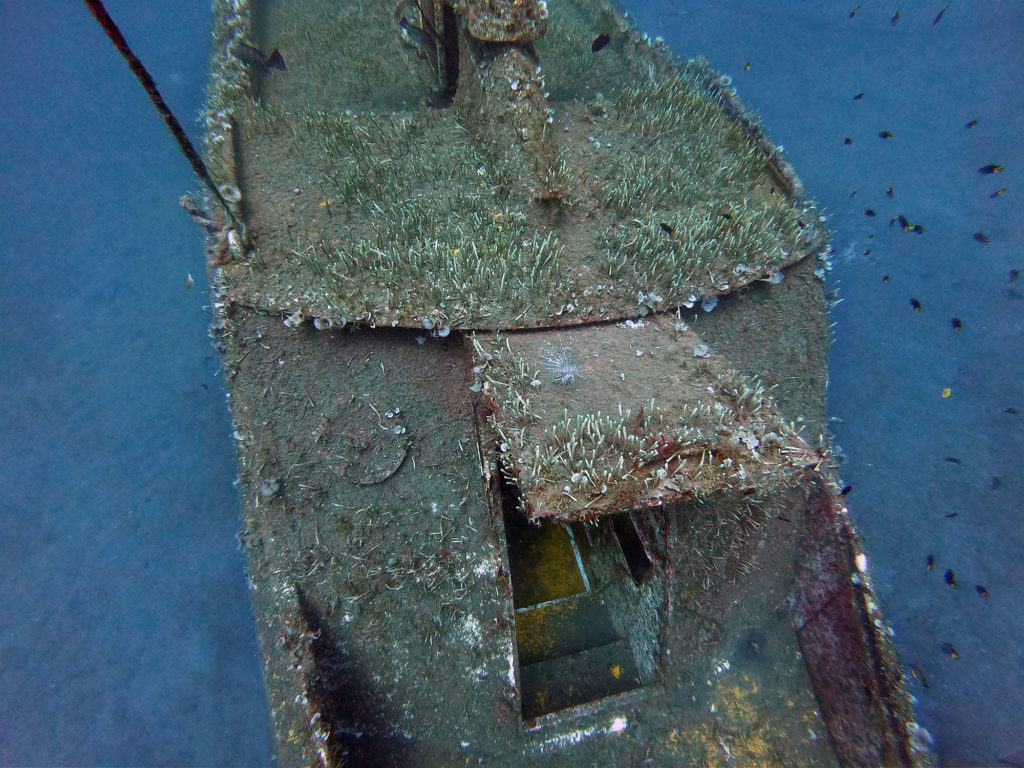
Image: Glenda Duarte (@glendarama)
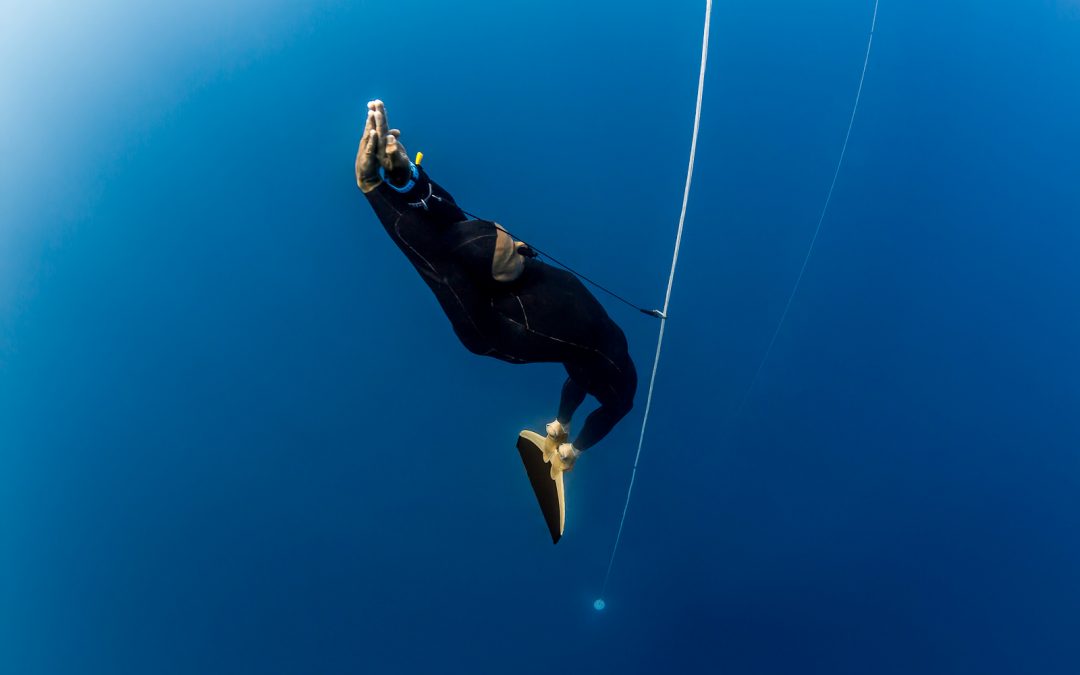
Apr 1, 2017 | Freediving, Yoga
It’s been a very a long time since we’ve posted a blog, but this freediving workshop really deserves a blog.
It’s something special, a very unique mix of cutting edge apnea research, tailored coaching, freediving focused yoga and meditation, all in beautiful Amed, Bali. This course is aimed at freedivers with an understanding of the basics of Freediving Physiology and Physics, with a desire to deepen and expand perspectives, seeing where the latest research in apnea is taking us.
Frederic Lemaitre will be our guide for most of the daily coaching and freediving workshops. He’s one of the worlds leading experts on freediving science and is at the forefront of apnea research. Frederic is also a top freediving coach, working with the first generation of the 1990s French elite up to today, with the likes of Guillaume Nery.
Each day is a mix of freediving, workshops, yoga and meditation workshops with the focus very much on deepening knowledge and changing perspectives.
DAY 1
The first days stretching will be whole body basic stretching;
Freediving will be focused on safety protocol as developed in his research with AIDA and Free immersion diving
The first days topic will be on advanced freediving physiology where
Frederic Lemaitre will be drawing on the insights gained from over 2
decades as a top apnea researcher. Related to this topic he’ll draw from over 40 different papers published between 2000 and 2017.
The most recent paper was in 2015 comparing the trigeminocardiac reflex
(TCR) with the Mammalian dive response.
Like all the workshops there will be an opportunity to for questions and answers with Frederic.
In the evening there will be a workshop on equalization for freedivers,
focusing on the various techniques available to freedivers, frenzel,
forms of mouthfill etc.
Day 2
In the morning we’ll have some basic stretching and a yoga sequence
designed for freedivers.
The Freediving training will focus on various exercises for
equalization and free immersion diving. The theory workshop will focus on ‘effects of freedive training’ drawing
on research from at least 8 separate papers by Frederic, from the
effects of apnea training on swimming co-ordination to the effects of packing, with a general review on freediving physiology.
The evening session will focus on 2 categories of meditation-
concentration and mindfulness
There will be some theory and some reference to the science behind these
practices, as well an an introduction to one or two practices in each
category.
We’ll also look at how these practices can affect our freediving training.
Day 3
Breathing and stretching
The morning stretching session will focus on the primary and secondary
breathing muscles.
CWT and FI
Principles of freedive training;
This wokshop will focus on training principles and primarily reference three papers, including one that deals with free diver training as a complement to other athletic training.
Meditation workshop- contemplation and creative visualization;
This workshop will investigate 2 other categories of meditation in regards to freediving.
The first will use the power of the rational mind to create break throughs and insight. The visualization practices will focus on harnessing the innate creative power of the mind.
Day 4
Acro- stretching
Freediving risks, blackout, decompression sickness, squeeze.
This is one of the most fascinating workshops as it draws on very interesting new research and introduces solid science based protocols for Decompression sickness, Blackouts and Squeeze. Frederic is one the people writing the guidelines for what is safe in freediving, based on science and not speculation. He is one of the lucky few who has done extensive research with the Ama divers of Japan.
Meditation- this final day will look at slightly more esoteric aspects of meditation, most specifically heart based practices.
Day 5
Stretching- routine
Homo Delphinus- comparative physiology.
A comparison between marine mammals and human mammals.
In this workshop Frederic explores what apnea training and apnea research can tell us about the human being and ways it can be used toimprove our development.
To make this accessible to poor freediving instructors we are offering the full 5 days training and workshops $400
contact info@apneista.com
Aug 12, 2015 | Uncategorized
Recently we had great review in the blog of Finnish freediving student. Check it out here, freediving blogpost
If you had a great time freediving with us, please give us a review on the all powerful tripadvisor.
Apr 27, 2015 | Freediving, Freediving courses
Freediving courses save lives.
A few years ago I was freediving on the reef in Jemeluk bay, East Bali. Upon surfacing from one dive my hands shook a little. It was a very short lived sensation. I considered the dive to be nowhere near my limits so it didn’t occur I might have become hypoxic. It was only several days later when diving alone on the reef that I once again had a similar experience. Upon breaking the surface my body rocked with a small samba. I knew I was definitely on the point of black out. It was then I decided to see a doctor. Tests revealed that I had become quite anemic.
What is anemia?
Anemia is a very good reason to never freedive alone. Anemia is a condition where there are less red blood cells than usual, which means there is less Oxygen stored in the blood. It can be caused by medical conditions or problems with absorption of iron, folic acid or vitamin B12.
In my case my comfortable breath-hold time wasn’t affected, but my hypoxic limit was much reduced. This meant I was able to bring myself close to the point of blacking out on dives that had been previously well within my comfort zone. I was freediving alone and was very lucky not to have blacked out completely. I taught good safety protocols but sometimes didn’t feel the need to follow them myself, in my instructors arrogance. That day it almost cost me my life.
Small physiological changes in the body can be fatal to the solo freediver.
In the same bay a month or so later another freediver wasn’t so lucky. Though he was a strong free-diver he hadn’t taken and formal freediving course. He was with his fiancé, two weeks engaged. She was on scuba with a local dive-master. He was diving down to them and following them on their dive. They lost track of him, but didn’t worry about it too much, he was a good freediver and the depths were pretty shallow for him.
It was only later after frantic searching and returning to the shore that their worst fears were realized. He was brought back to the beach by a Japanese Divemaster who had found him while diving with his students. He had promised his fiancé that he would really take it easy. Personally I believe he probably did think he was taking it easy.
According to his heartbroken fiancé he had suffered with some quite bad diarrhea on the days before the accident. It is very possible that he had low blood pressure from dehydration and had no more idea he was pushing his limits than I did when I had my anemic ‘samba’.
A freediver has to trust his body, but solo freediving is to trust blindly, so that small un-noticed changes in the body, such as low blood pressure or anemia can have fatal effects.
Here’s the guidelines we teach all our students on freediving courses.
Never freedive alone
Always follow a one up/up down protocol, with visual reference.
Never freedive when feeling sick or under the weather.
Never hyperventilate (and understand precisely what hyperventilation is)
Avoid going more than 50% of your maximum depth.
Come up on the first urge to breathe.
Always check local conditions, currents, tides, thermoclines etc.
Never take air from a scuba diver.
Wait at least 12 hours after SCUBA to freedive.
As a postscript; after the trauma of her loss his fiancé did some research to understand how he could die in this unpredictable way. She ended up taking freediving courses and is now a very passionate freediver and lover of all things related to the sea.
Apr 6, 2013 | Freedive Training, Freediving, Freediving courses, Yoga
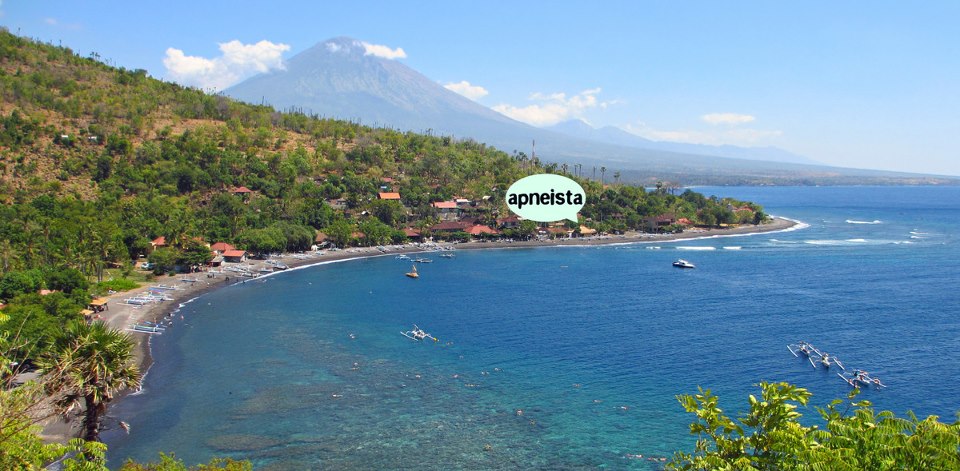
We’re coming up to three years that we started the whole apneista project in Bali and the last year and a half has been really intense. . with lots of new stuff.. starting at what I reckon is probably one of the coolest…
Dark moon freediving…
That’s it, freediving at night..We have now started using the latest in glow in the dark rope ‘technology’. two glowing lines, the liquid darkness and clouds of bio-luminescence. It is an intensely beautiful and surreal experience, something difficult to describe or photograph, like the Northern lights…We have established a whole new protocol for this activity and it is open only to students who have shared some training with us (for obvious safety considerations.)
Freedive trips to nusa penida to Freedive with mantas,
We’re organising group trips to freedive with Mantas and other pelagics on the amazing reefs of Nusa penida, starting in May.
Freediving trips to Komodo and Raja Empat,
We are teaming up with Graham Abbot, one of the most respected specialist dive guides in this incredible area to offer something really special, freediving, yoga and Scuba trips to the Eastern Dive Jewels of Indonesia.
Fly and dive intensive.
From the 7th to the 12th and from the 15th to the 22nd of September Acroyoga and freediving intensives…with the amazing Bex Tyrer, Bali’s queen of acroyoga. This practice is a beautiful hybrid of acrobatics, yoga and Thai massage with one person ‘flying the other’ with another acting as a spotter.. It is the perfect complement to freediving in every way, we are pretty excited about this.
SSI certification.
Another bit of news is that we are now offering SSI certification alongside our own Apneista training system. We will continue to do what we do best, adapting training to suit the individual and expanding our curriculum, but now for those interested in Global certification we now offer SSI training as well. For those who want to get signed off for SSI,we will be running one day SSI assessments during May.
New training space, yoga sala, cafe, equipment shop and more training lines.
On the beautiful bay of Jemeluk we are finally finished with the unending refurbishment and we now have what we firmly believe is the sweetest freediving shop in all of Asia. Chill out area, yoga sala, equipment shop and now a wonderful cafe, right on the beach. We have also set more lines at various depths and are now initiating some reef and beach clean ups, so that Bali’s best freediving spot becomes even better. Please roam the webpage for more details and pics.We are still processing a resource page with interesting research and training material relating to the breath,freediving and yoga, coming soon…
P.S. anyone with 5 minutes to spare and with great things to say about us here’s a link to tripadvisor, your help is sincerely appreciated.





